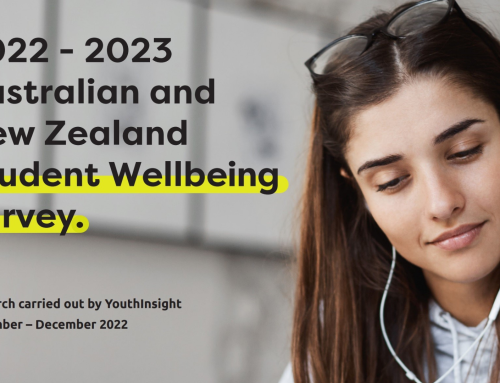As part of Studiosity’s annual Student Wellbeing Survey, YouthInsight asked university students from Australia and New Zealand about their university experiences and perceptions. In this most recent wave of the research, 10 per cent of the total population were international students, who reported having higher engagement with various support services than domestic students, potentially feeling more connected to their peers as a result.
Here is a round-up of the key insights from Chapter 5: International Students’ Perceptions & Behaviours (2022 – 2023 Australian and New Zealand Student Wellbeing Survey).

KEY INSIGHTS
- International students are more interested in global ranking scores than domestic students (25% vs 10%), highlighting the ongoing importance of university rankings in attracting prospective international students to Australian universities.
- Compared to domestic students, international students are less likely to have heard about academic integrity (79% vs 63%) or where to find help with referencing (65% vs 51%), showing that universities must do more to better support and inform international students about these practices.
- International students are using academic and peer support services at higher rates than domestic students, potentially explaining why international students feel more connected with their peers.
Our research with university students found that stress remains high. The number one source of stress for all university students is balancing study time with other responsibilities and commitments (including employment, social and extracurricular activities). Students desire greater flexibility, and many are lacking a sense of community at their institutions – calling for stronger connection and peer-to-peer support. With many students now managing additional responsibilities on top of their studies – including more than 80 per cent working while studying – universities must consider how they can support students, including responding to their want for hybrid study and flexibility.
In the 2022 – 2023 Australian and New Zealand Student Wellbeing Survey, 10 per cent of the population were international students. The data showed attitudinal and experiential differences in their university experience from domestic students, including in their uptake of university and peer support programs, awareness of academic integrity, and future job readiness.
International students’ university perceptions and uptake of support services
Overall, international students are more attracted to global ranking scores than domestic students. This highlights the ongoing importance of University rankings including Times Higher Education World University Rankings and QS World University Rankings in attracting prospective international students to Australian universities.
When it comes to the use of support services available from universities, international students are more likely to use both academic and peer support services than domestic students. This higher engagement may potentially explain why international students feel more connected with their peers than domestic students (96% vs 85%).
Across the total population, students wanting a connection with their peers correlated with higher stress frequency (74 per cent feel stressed weekly or more) compared to 66 per cent who are happy with their level of connection with other students. With 14 per cent of students reporting feeling completely disconnected at university, more focus is needed to better support students’ connection with their peers through events that drive connection and belonging. These data show not only the importance of such initiatives in the higher education sector, but the importance that these initiatives are ongoing and well-resourced.
International students have higher interest in practical work experience and internships
Universities cannot overlook the importance of mentorship being made available to students. Here, almost one in two international students who did not engage in peer support reported wanting a senior mentor.
Across the total population, confidence in future employment opportunities varied by study level and gender – with self-confidence of women and undergraduate students most impacted.

When asked about what their university could offer to make them feel more optimistic about future job prospects, students are overwhelmingly calling for more internships and practical work experience to be provided by their university. To address this issue, more needs to be done within the sector to help students bridge the gap between academia and employment. This is a space where mentorship can also support students in their development.
A gap in information on academic integrity
Compared to domestic students, international students are less likely to have heard about academic integrity (79% vs 63%), and less likely to know about where to find help with referencing (65% vs 51%). Here, universities must consider how they can better support and inform international students about these practices, and the expectations of academic integrity processes. Interestingly, international students who have heard about academic integrity are more likely than domestic students to have learnt about these practices through student services (27% vs 15%), reflecting their higher uptake of such services at university.
Within the total population surveyed, awareness of other students cheating is on a downward trend, dropping from a high of 30 per cent in 2020 to a low of 15 per cent in 2022. On the topic of cheating-related issues, students’ qualitative reposes highlighted confusion about what constitutes cheating; use of online study assist Web sites; impact of open book exams; and evaluation methods introduced during the Covid-19 pandemic.
With technology changing at a rapid pace, universities must adapt to keep pace. It is more important than ever for universities to partner with their students to develop robust teaching, learning and examination practices, review how we assess and examine students and their work, and understand the ethics, accuracy, usage and transparency of new tech, including Generative AI.
WANT TO LEARN MORE?
Read our chapter-by-chapter insights from the 2022 – 2023 Australian and New Zealand Student Wellbeing Survey below:
Chapter 1: Students’ Experiences of Stress & Priorities
Chapter 2: Connection & Support at University
The survey ran from 14th November to 6th December 2022 and gained a total of 1,137 responses, of which 995 were in Australia, while 142 were in New Zealand. All Australian public universities were represented in the Australian sample. In New Zealand, all universities were represented.
Data charts sourced from Chapter 5: International Students’ Perceptions & Behaviours









Leave A Comment